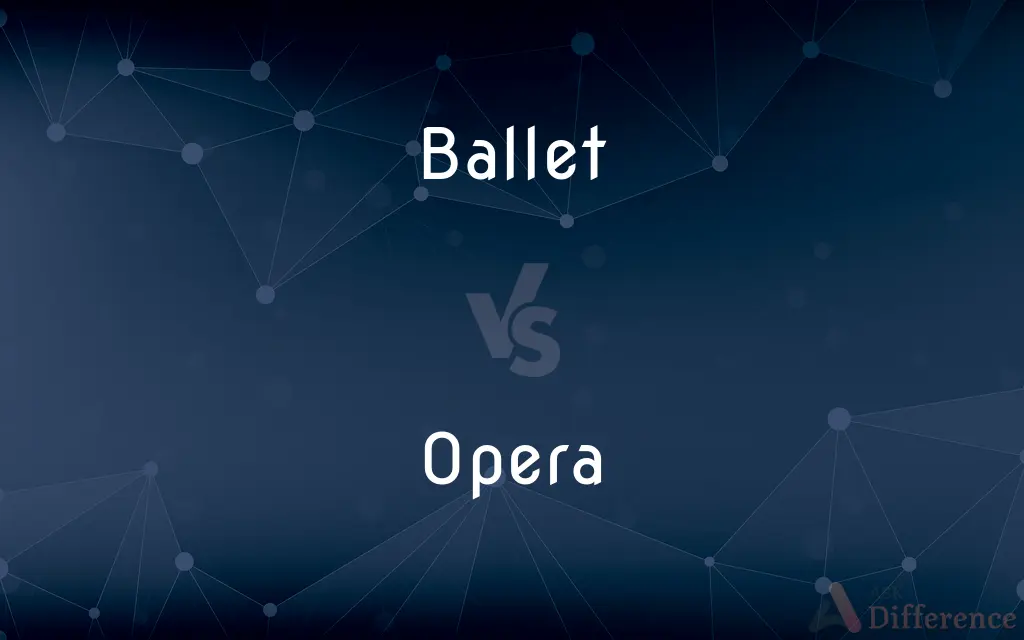Ballet vs. Opera — What's the Difference?
Edited by Tayyaba Rehman — By Fiza Rafique — Updated on November 3, 2023
Ballet is a form of dance with music but no singing; opera is a dramatic art form combining singing, music, and sometimes dance.

Difference Between Ballet and Opera
Table of Contents
ADVERTISEMENT
Key Differences
Ballet is a highly stylized performance dance that often tells a story through choreographed movements and physical expressions, performed to the accompaniment of music. Opera, distinctively, is a theatrical production where the story is conveyed primarily through music and singing, complemented by costumes, scenery, and acting.
In ballet, dancers use precise and formalized steps and gestures set in intricate, flowing patterns to create expression. Unlike ballet, opera focuses on vocal performance, with singers using various techniques to project and articulate the narrative.
The narrative in ballet is told without words, leaving much to the interpretation of the audience. On the other hand, opera employs a libretto, a text or script, sung by performers, often in a foreign language, with subtitles provided for understanding.
Ballet can incorporate pantomime to tell its story and express emotions, but it does not include the spoken word. Opera incorporates spoken dialogue in some forms, such as opera comique, but the majority is sung in a continuous musical discourse.
Orchestral music is central to both ballet and opera; however, in ballet, music serves as a backdrop for the dance, while in opera, the music directly supports the vocalists and narrative.
ADVERTISEMENT
Comparison Chart
Primary Art Form
Dance
Singing
Storytelling
Through movement and mime
Through music and lyrics
Music
Instrumental accompaniment
Integral with vocal performance
Vocalization
No singing
Singing is central
Example of Works
"Swan Lake" by Tchaikovsky
"La Traviata" by Verdi
Compare with Definitions
Ballet
Theatrical dance with choreography and music, but typically no spoken dialogue.
She trained for years to become a principal dancer in the ballet company.
Opera
A dramatic work in one or more acts, set to music for singers and instrumentalists.
They attended the opening night of the opera at the city's grand opera house.
Ballet
A performance in which a story is told using expressive body movements.
The ballet's interpretation of Romeo and Juliet was breathtaking.
Opera
An art form where the emotional subtext is conveyed through melody, harmony, and orchestration.
The beauty of opera lies in how the music and human voice merge to express the ineffable.
Ballet
A company of dancers that perform ballets.
He designed elaborate costumes for the national ballet's upcoming season.
Opera
A theatrical presentation where a story is communicated entirely through music and singing.
The powerful arias and ensembles are what make this opera so compelling.
Ballet
An artistic dance form performed to music using precise and highly formalized set steps and gestures.
The ballet premiered a new work combining contemporary music and classical technique.
Opera
A company or building for the performance of operas.
The restored opera house will host a season of classic Italian operas.
Ballet
Ballet (French: [balɛ]) is a type of performance dance that originated during the Italian Renaissance in the fifteenth century and later developed into a concert dance form in France and Russia. It has since become a widespread and highly technical form of dance with its own vocabulary.
Opera
A composition that combines text (libretto) and musical score in a dramatic narrative form.
The composer is renowned for the complex characters he creates in his operas.
Ballet
A classical dance form characterized by grace and precision of movement and by elaborate formal gestures, steps, and poses.
Opera
Opera is a form of theatre in which music is a fundamental component and dramatic roles are taken by singers, but is distinct from musical theatre. Such a "work" (the literal translation of the Italian word "opera") is typically a collaboration between a composer and a librettist and incorporates a number of the performing arts, such as acting, scenery, costume, and sometimes dance or ballet.
Ballet
A theatrical presentation of group or solo dancing to a musical accompaniment, usually with costume and scenic effects, conveying a story or theme.
Opera
A theatrical presentation in which a dramatic performance is set to music.
Ballet
A musical composition written or used for this dance form.
Opera
The score of such a work.
Ballet
A classical form of dance.
A classically-trained ballet dancer
Opera
A theater designed primarily for operas.
Ballet
A theatrical presentation of such dancing, usually with music, sometimes in the form of a story.
Let's go to the ballet in the theatre tomorrow!
Opera
A plural of opus.
Ballet
The company of persons who perform this dance.
Zara joined the ballet at the age of 14.
Opera
A creative work, especially a musical composition numbered to designate the order of a composer's works.
Ballet
(music) A light part song, frequently with a fa-la-la chorus, common among Elizabethan and Italian Renaissance composers.
Opera
(music) A theatrical work, combining drama, music, song and sometimes dance.
Ballet
A (small) ball i.e. roundel on a coat of arms, called a bezant, plate, etc., according to colour.
Opera
(music) The score for such a work.
Ballet
(figurative) Any intricate series of operations involving coordination between individuals.
Opera
A building designed for the performance of such works; an opera house.
Ballet
To perform an action reminiscent of ballet dancing.
Opera
A company dedicated to performing such works.
Ballet
An artistic dance performed as a theatrical entertainment, or an interlude, by a number of persons, usually women. Sometimes, a scene accompanied by pantomime and dancing.
Opera
(by extension) Any showy, melodramatic or unrealistic production resembling an opera.
Ballet
The company of persons who perform the ballet.
Opera
Plural of opus; a collection of work.
Ballet
A light part song, or madrigal, with a fa la burden or chorus, - most common with the Elizabethan madrigal composers; - also spelled ballett.
Opera
A drama, either tragic or comic, of which music forms an essential part; a drama wholly or mostly sung, consisting of recitative, arias, choruses, duets, trios, etc., with orchestral accompaniment, preludes, and interludes, together with appropriate costumes, scenery, and action; a lyric drama.
Ballet
A bearing in coats of arms, representing one or more balls, which are denominated bezants, plates, etc., according to color.
Opera
The score of a musical drama, either written or in print; a play set to music.
Ballet
A theatrical representation of a story performed to music by ballet dancers
Opera
The house where operas are exhibited.
Ballet
Music written for a ballet
Opera
A drama set to music; consists of singing with orchestral accompaniment and an orchestral overture and interludes
Ballet
A classical dance form characterized by grace and precision of movement.
The Nutcracker is perhaps the most famous ballet in the world.
Opera
Theater where opera is performed
Common Curiosities
Are operas always performed in foreign languages?
Many classic operas are in Italian, German, or French, but they can be performed in any language.
Is opera singing different from regular singing?
Opera singing requires specific techniques to project the voice and convey dramatic expression.
Can a ballet tell a story?
Yes, many ballets tell stories through dance and mime.
What defines a ballet?
Ballet is defined by its formal technique, graceful movements, and use of pointe work.
What are subtitles in opera?
Subtitles, or surtitles, are translations of the libretto displayed for the audience.
What is the primary feature of opera?
The primary feature of opera is its combination of theatrical storytelling with orchestral music and vocal performance.
Is ballet older than opera?
Ballet and opera both have roots in the Renaissance, but opera as a distinct form emerged slightly later.
What is a prima ballerina?
A prima ballerina is the leading female dancer in a ballet company.
Do ballet performances include singing?
No, ballet typically does not include singing.
What is a score in opera?
The score in opera is the musical notation and composition that accompanies the libretto.
What is a libretto in opera?
A libretto is the text or script that the singers perform in an opera.
Do ballet dancers sing while they dance?
No, ballet dancers focus exclusively on movement.
How long is a typical ballet performance?
Ballet performances can range from one to three hours.
What's the difference between opera and musical theatre?
Operas are primarily sung, while musicals combine songs with spoken dialogue.
Can ballet be contemporary?
Yes, there is both classical ballet and contemporary ballet, which breaks from traditional technique.
Share Your Discovery

Previous Comparison
Henceforth vs. Thenceforth
Next Comparison
Cast vs. CastedAuthor Spotlight
Written by
Fiza RafiqueFiza Rafique is a skilled content writer at AskDifference.com, where she meticulously refines and enhances written pieces. Drawing from her vast editorial expertise, Fiza ensures clarity, accuracy, and precision in every article. Passionate about language, she continually seeks to elevate the quality of content for readers worldwide.
Edited by
Tayyaba RehmanTayyaba Rehman is a distinguished writer, currently serving as a primary contributor to askdifference.com. As a researcher in semantics and etymology, Tayyaba's passion for the complexity of languages and their distinctions has found a perfect home on the platform. Tayyaba delves into the intricacies of language, distinguishing between commonly confused words and phrases, thereby providing clarity for readers worldwide.













































